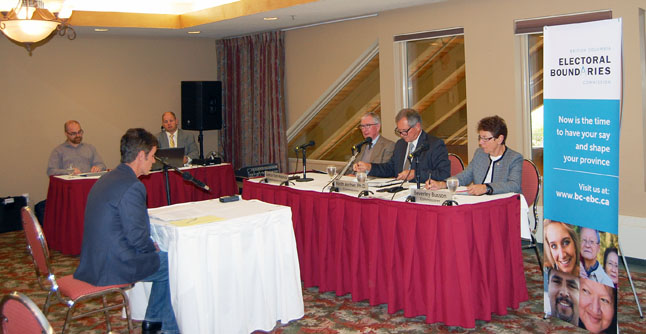
By David F. Rooney
Does our electoral district need some tweaking? Absolutely not was the message BC’s Electoral Boundaries Commission heard during a hearing at the Hillcrest Hotel on Tuesday morning, October 7.
Former City Councillor and teacher Bill MacFarlane recommended that the commission leave the enormous Columbia River Revelstoke riding alone.
He said that, in his experience, residents are comfortable with the electoral district as it exists today. Its many different communities, such as Revelstoke, Golden, Invermere and Kimberley share similar economies, geography and lifestyles.
Commissioner Tom Melnick wondered if, perhaps, Kimberley could be hived off and merged with East Kootenay since it is just a few miles away from Cranbrook. Or perhaps, suggested Commissioner Beverley Busson, Nakusp could join Columbia River Revelstoke?
“Is there a small area anywhere that might be massaged?” Melnick asked.
Or perhaps Fernie and Sparwood could join Columbia River Revelstoke, fellow Commissioner Keith Archer wondered aloud.
“As I recall those very questions were considered (by the 2007 Electoral Boundaries Commission),” MacFarlane said, adding that such a change would only make the constituency even larger than it is now — 39,135 km2. And that would only make it even more difficult for the MLA to get around it.
Commissioners Tom Melnick, Keith Archer and Beverley Busson have, since September 22, been visiting 29 communities gauging the public appetite for boundary change. While MacFarlane was the only person to appear before the commission on Tuesdays any member of the public can file his or her views through an online submission form on the commission website (www.bc-ebc.ca), by email to info@bc-ebc.ca or by mail to PO Box 9275 Stn Prov Govt, Victoria, BC, V8W 9J6. All submissions must be received by the commission by Sunday, November 16, 2014.
The fact that MacFarlane was the only person to appear before the commission was not that unusual.
People tend to speak up when they are dissatisfied with a particular situation and otherwise do not speak out.
“We do on occasion throw out ideas to people who might not otherwise have come up with them,” Melnick said during a post-hearing interview. “We’ll say what do you think of this?… And then we’ll get a reaction.”
Busson said fomenting discussion is a good way to determine what’s working and what’s not — particularly in very large ridings where an MLA’s ability to get around easily is hampered by geography.
“People’s accessibility to their MLA is a really important factor,” she said, adding that geography frequently determines how accessible an MLA can be.
So far, the commission has visited communities in the North and the Interior and is receiving the impression that most people like things the way they are.
“Most people are reasonably satisfied with the status quo at the present time,” Melnick said, adding that they still have to hold hearings in the Lower Mainland and on Vancouver Island where population change has been more drastic than here.
The commission’s preliminary report to the Legislature will be delivered by May 9, 2015.



